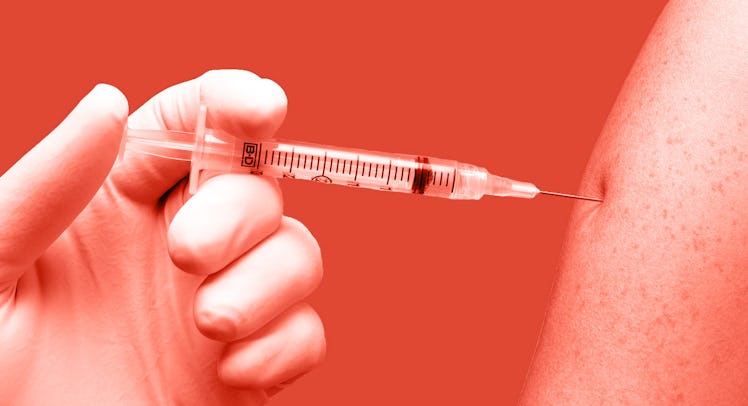How to Help Young Children Afraid of Getting Shots
Being empathetic with young children about their fear of needles is far more effective than telling them it won't hurt when it probably will.

Children are often more against getting shots than even the most extreme anti-vaxxers — not because they’re naturally drawn to junk science, but because they don’t handle the anxiety around looming pain well. Kids don’t know much, but they know that needles hurt. In fact, needle phobia is very, very common among young children. Fortunately, there are simple things parents can do to make shots easier on their kids and their kids’ pediatricians. Likewise, there are plenty of things moms and dads can stop doing that are probably making matters worse.
“Many kids have needle phobia and just thinking about the shot makes them so anxious it is incredibly difficult to get them to relax for an exam,” Don Shifrin, clinical professor pediatrics at the University of Washington and Fellow of the American Academy of Pediatrics, tells Fatherly. In his 39 years of clinical practice, Shifrin has seen plenty of kids run out of the room.
Both children and adults are plagued with needle fears, which have more than tripled in recent years, research shows. One study of over 800 parents and 1,000 kids found that nearly a quarter of parents and over half of children fear needles. Of those, almost 10 percent of parents and kids cited this fear as their primary reason for not getting vaccines.
Parents often accidentally exacerbate kids’ fear of needles, making things worse by preparing kids in ways that make them more anxious — or not preparing them at all. Shifrin says that, in many of cases, kids have had traumatic experiences with shots and are, in fact, not being behaving illogically. When parents try to handle understandable fears by not telling kids about shots, the kids panic at the last second. When they give them too much warning or add threats on top of needle anxiety, they also to exacerbate the problem. Even dismissing a child’s fear can make things worse because it gives them both a reason to overreact and a reason to not trust parents in the future if, in fact, it does hurt.
In other words, preparing kids for shots is incredibly difficult and parents shouldn’t feel at all bad about that fact that they’re likely doing it in a less than ideal manner. However, they might do well to consider a new tact.
What Shifrin does instead, and what he recommends parents do, is respond to children’s needle phobia empathetically and directly. Ask children if they remember their last shot and if it hurt a lot. Let them know that getting shots is painful for grownups as well. Then empower them by explaining that there are ways to make it hurt less like taking deep breaths, squeezing mom or dad’s hand, or singing a song. Because distraction can genuinely ameliorate kids’ pain, this has the rare virtue of truth.
It may also help to explain how vaccines work so the whole unpleasant event feels significantly less random and sadistic. Mom and dad don’t enjoy watching children get stuck, they do it because they want to make sure that everyone is safe. It is worth adding that people get vaccines not only to protect themselves, but in order to make sure that their friends and loved ones don’t get sick. It’s a community effort.
“I like to remind them that shots make their bodies work like superheroes to fight bad bugs that could make them sick, miss school and activities, or make their siblings at home sick as well,” Shifrin says.
Once the tears have dried and the bandages and kisses have been applied, a little positive reinforcement can go a long way. Even if a child did freak out, it’s important to give positive feedback because that becomes part of their understanding of the experience. Ice cream helps.
This article was originally published on